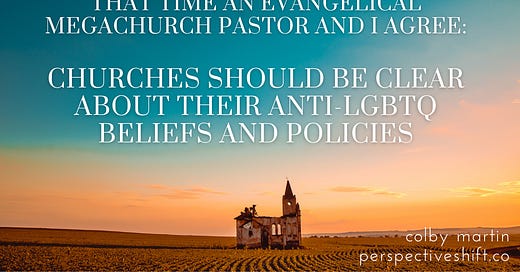An Evangelical Megachurch Pastor and I Both Agree: Churches Should Be Clear About Their Anti-LGBTQ Beliefs and Policies
While we have different reasons for our convictions, I am happy to report that I actually agree with evangelical megachurch pastor and author, J.D. Greear.
The other day I was reading an article from a prominent evangelical pastor/author, J.D. Greear titled “Downplaying the Sin of Homosexuality Won’t Win the Next Generation.” He wrote it in response to …
Keep reading with a 7-day free trial
Subscribe to Perspective Shift by Colby Martin to keep reading this post and get 7 days of free access to the full post archives.





